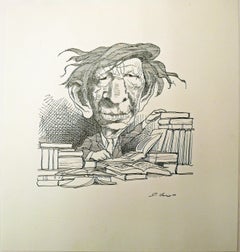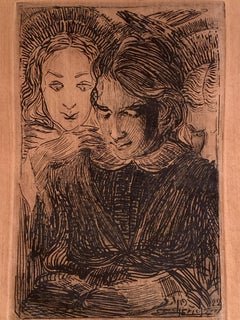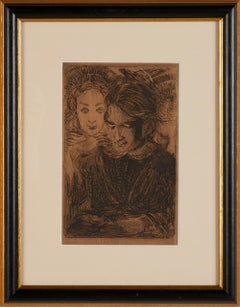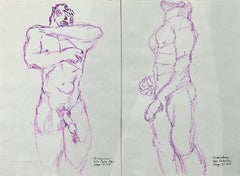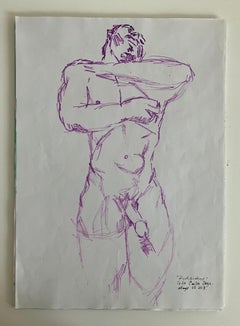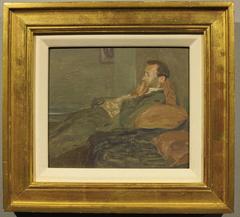By David Levine
Located in Wilton Manors, FL
David Levine (1926-2009). View from Sacre Coeur, 1961. Oil on wood panel, 16 x 20 inches; 2o x 24 inches framed. Signed and dated en verso. Davis Galleries label affixed en verso. Excellent condition with no damage or restoration.
Widely acknowledged as one of the greatest caricaturists of the second half of the 20th century, David Levine was best known for his drawings for the New York Review of Books (which spanned more than 40 years), Esquire, Time magazine and The New Yorker. Awarded numerous prizes for his work, which was reproduced worldwide and influenced a generation of international cartoonists, he was also an accomplished painter in watercolours and oils.
David Julian Levine was born on 20 December 1926 in Brooklyn, New York, the only child of Harry Levine, who ran a small clothing factory specialising in women’s dresses from a loft on Sixth Avenue, and Lena Isaacson, a nurse. Though not an academically strong pupil (“I didn’t do anything in school – I studied volleyball”), he excelled in drawing and wanted to become a comic-book artist like Will Eisner (creator of The Spirit). At the age of nine he won a contest sponsored by Walt Disney to draw the character Goofy and was invited to audition as an animator for the Disney studio in Los Angeles.
However, his parents decided against this and after he left Erasmus Hall High School, Brooklyn, they sent him to study painting at the Tyler School of Fine Arts at Temple University in Philadelphia (1944). After spending his national service (1945-6) in the US Army, serving as a cartographer in Egypt, he returned to complete his degree and take an art teacher’s certificate (1946-9). He then studied with the Abstract Expressionist painter Hans Hoffman at the Eighth Street School of Painting in Manhattan (1949).
Intending to become a professional painter, his first works (mostly watercolours) were scenes of pressers, cutters, fitters, sewing-machine operators and others in his father’s factory and seaside panoramas of bathers at nearby Coney Island. He began to exhibit regularly at the Davis Gallery in New York from 1954 (until 1963), winning four awards for his paintings from the National Academy of Art & Design. In 1958 he and fellow artist Aaron Shikler (whose portrait of John F Kennedy hangs in the White House), formed the Painting Group, which met regularly over the next 50 years to paint life models (US Supreme Court judge Sandra Day O’Connor famously sat for them in 2006).
Failing to make a sufficient income from his paintings alone, he also began to work as an illustrator for Gasoline Retailer and other publications. In addition, he published a series of Christmas cards based on Charles Dickens’ A Christmas Carol and illustrated books such as Elizabeth Kirtland’s children’s fantasy Buttons in the Back (1958).
His first drawings for Esquire appeared in 1958 and over the following years Levine produced more than 1000 illustrations for the magazine. However, his big break came in 1963 when he was invited to join the New York Review of Books as staff artist, shortly after it was founded. In all he drew nearly 4000 caricatures (including covers) for the Review – earning at his peak more than $12,000 a month from this publication alone – until ill health and failing eyesight (macular degeneration) forced him to retire 44 years later in April 2007 (his last original drawing for the Review was of the novelist Howard Norman).
Levine also worked for The New York Times, Washington Post, Rolling Stone, Sports Illustrated, New York Magazine, Time magazine (nearly 100 drawings including some notable covers), Newsweek (including covers), The New Yorker (more than 70 drawings), Harper’s, The Nation, Playboy and others. In addition, his caricatures appeared in many international publications, including The Sunday Times, the Observer, Daily Telegraph magazine and others in the UK.
Though he drew numerous global public figures in politics, the arts, sport, current affairs and history – from Winston Churchill, De Gaulle and Gandhi to Castro, Mao Zedong and Brezhnev – he was perhaps best known for his portraits of US celebrities, especially presidents. He produced more than 60 caricatures of Richard Nixon for the New York Review of Books alone (notably as Humphrey Bogart’s Captain Queeg in the 1954 film version of The Caine Mutiny) and his many (40 plus) portraits of Lyndon B Johnson for the Review included his most famous work, criticising LBJ’s role in the Vietnam War. Based on a celebrated 1966 press photograph of Johnson proudly pointing at the scar on his stomach after a recent gall-bladder operation, in Levine’s version the scar is made to resemble the outline of Vietnam. This drawing appears on the cover of Levine’s last book, American Presidents (2008), which features caricatures of US leaders over half a century (a tie-in exhibition was held at the New York Public Library the same year).
Other books by Levine include A Summer Sketchbook (1963), The Man from M.A.L.I.C.E. [Movies, Art, Literature and International Conmen’s Establishment] (1966), Pens and Needles: Literary Caricatures (1969), Caricatures (1969), Identikit (1969), No Known Survivors (1970) and The Arts of David Levine (1978). He also illustrated a number of works by others including Washington Irving’s Rip Van Winkle (1963), Vance Nye Bourjaily’s The Unnatural Enemy (1963), William Hauff’s The Heart of Stone (1964), James Playsted Wood’s The Snark Was a Boojum: A Life of Lewis Carroll (1966), Albert E Kahn’s Smetana and the Beetles: A Fairy Tale for Adults (1967), Harold Hayes’ (ed.) Smiling Through the Apocalypse: Esquire’s History of the Sixties (1969), John Osborne’s The Fifth Year of the Nixon Watch (1974), The Fables of Aesop (1975), Joseph Moses’ The Great Rain Robbery (1975), Judy Jones and William Wilson’s An Incomplete Education (1987) and Robert B Silvers and Barbara Epstein’s (eds) A Middle East Reader (1991). Many of his drawings also appeared in calendars and as mousepads, postcards and other merchandise produced by the New York Review of Books.
Influenced by the Punch cartoonists Richard Doyle and Sir John Tenniel, as well as the Frenchmen Gustave Doré and Honoré Daumier and his fellow countryman Thomas Nast, his use of large heads on small bodies ultimately derived from the style popularised by the 19th-century Parisian André Gill...
Category
1960s Impressionist David Levine Art
